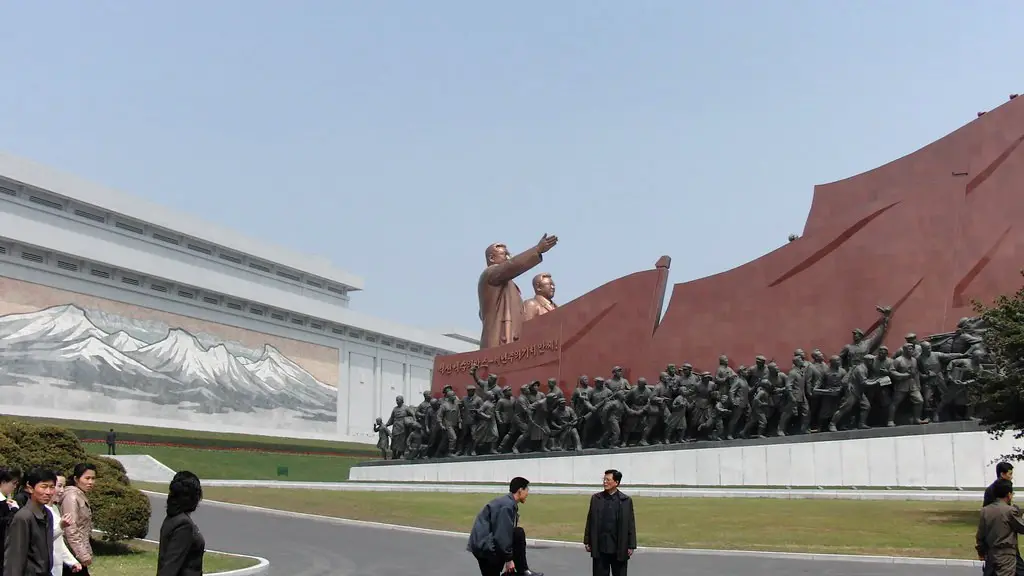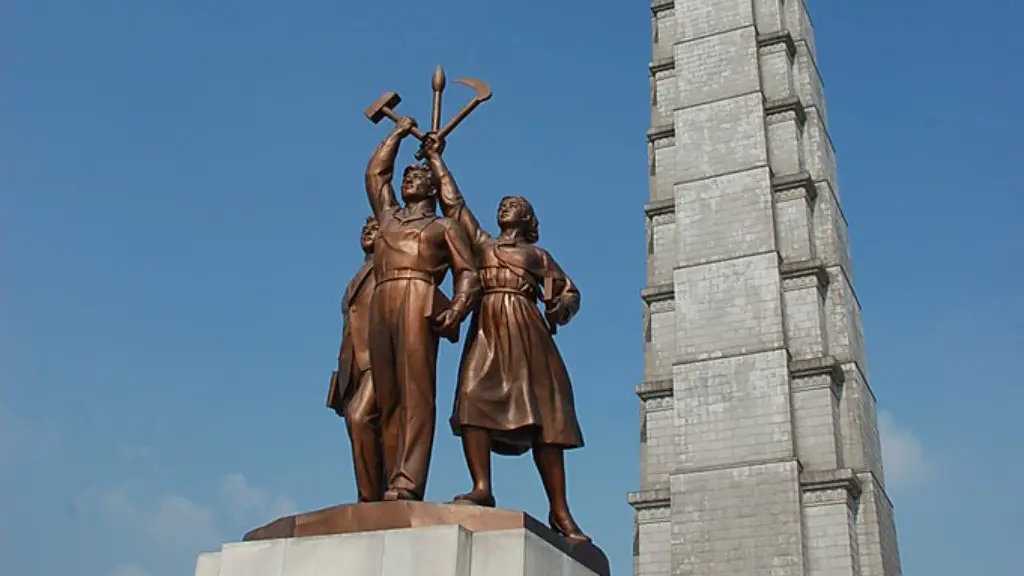The Pressures of an American Strike on North Korea
The US has long been gauging the possibility of launching an attack on North Korea, given its history of numerous missile tests and nuclear threats directed at American-allied nations in the area. The US has maintained a strong military presence in the area, and the Trump administration has made it clear that they want to take a strong stand against North Korea, with the possibility of a “military option” on the table, depending on the North’s response to diplomatic pressure.
The situation on the Korean Peninsula has become increasingly tense in recent years, with North Korea continuing to build its nuclear arsenal and test missiles, ignoring the United Nations Security Council’s calls for an end to the activity. This has posed a serious threat to the US and its allies in the region, prompting President Trump to take a harder stance than his predecessors.
While the US has previously threatened military action against North Korea, they have, up until now, refrained from launching a strike on the country. This is largely due to the fact that North Korea is one of the few nuclear-armed states in the world and any military action taken against it could result in a full-scale nuclear war in the region. The cost in terms of civilian life, destruction of infrastructure and geopolitical instability could be devastating and would be felt not just in the region but around the world.
In addition to the devastating potential consequences, experts have voiced concerns that a US strike on North Korea could lead to further military escalation by North Korea, including the possibility of executing military strikes against US allies in the region, Japan and South Korea. This could also see China get involved, which could further destabilise the region and lead to unpredictable consequences.
Despite the mounting pressure, the US has yet to take any decisive action against North Korea, opting for economic sanctions and diplomatic statements instead. This is likely due to the fact that the US is in a precarious situation, where any action taken against North Korea could result in serious consequences. While the US is not ruling out the possibility of a military option, it is clear that such an action is not seen as an ideal solution for the US.
The North Korean Perspective
From the North Korean perspective, an American strike on the country could be seen as an act of war, leaving the country no choice but to retaliate in full. This could lead to devastating conflict – with potential nuclear escalation – that could destabilise the entire Korean Peninsula, with South Korea and Japan potentially bearing the brunt of the conflict.
Furthermore, North Korea has repeatedly warned that any US aggression against it would trigger a “merciless counterstrike” by North Korean forces. This could include retaliatory strikes against US targets, both within North Korea and elsewhere, resulting in not just massive destruction but also the loss of innocent lives.
It is clear that the North Korean leadership is aware of the devastation that a US strike would cause and is likely to take steps to prepare for any action that could be taken against it. This includes pre-emptive strikes against US forces and their allies in the region in an effort to limit the damage caused by a US strike.
Efforts from Neighboring Countries
In the face of mounting pressure from the US, regional powers such as China and Russia have urged caution and proposed diplomatic solutions to de-escalate the situation. These countries are North Korea’s closest allies and have been working hard to find a peaceful resolution to the crisis.
China, in particular, has ramped up pressure on North Korea, imposing tighter economic sanctions and accusing the North of ignoring international law. China has also warned the US against any unilateral action, arguing that such an action could further destabilize the Korean Peninsula and could result in a full-scale war.
Russia has also called for restraint, urging the US to reconsider any military action against North Korea. This position is shared by numerous other nations, who believe that any strike on the North could result in a catastrophic conflict that could have far-reaching global consequences.
The Regional Impact of a US Strike
The possibility of a US strike on North Korea has been met with strong opposition from both regional and global players. This is due to the fact that an attack on the North by the US could have devastating consequences for other countries in the region, such as South Korea and Japan, who could find themselves caught in the crossfire of any potential conflict.
Moreover, there is a strong possibility that a US strike on the North could lead to further military escalation from North Korea, who may retaliate with pre-emptive strikes on South Korea and other US-allied countries in the region. This could result in a full-scale war, which would be devastating for the entire region and could lead to a significant loss of life and critical infrastructure.
The US’s Options
At present, the US has two main options when it comes to North Korea – either continuing to pursue a diplomatic solution or taking military action. Neither option is ideal, with the diplomatic approach proving to be ineffective in the past and any military action potentially leading to a full-scale war.
Nevertheless, the US and its allies are determined to find a peaceful solution to the crisis and have been working hard to encourage North Korea to abandon its nuclear and missile programmes. This includes sanctions and international condemnation, as well as offering the North incentives for cooperation.
The Impact of US Sanctions
The US is currently exercising a policy of “maximum pressure” on North Korea, which includes the imposition of economic sanctions on the country. This has been largely successful in curbing the North’s nuclear and missile programmes, with North Korea announcing that they are willing to resume negotiations with the US in response to the government’s pressure campaign.
The sanctions have also had an impact on the North Korean economy, with the country facing a severe shortage of food and other essential items due to the decrease in trade with other countries. This has led to a rise in poverty and economic hardship for many North Koreans, who are struggling to survive in the face of a worsening economic situation.
The Threat of North Korean Propaganda
The US is also faced with the threat of North Korean propaganda, which is being used to fuel nationalistic sentiment and encourage its citizens to rally against American aggression. This has been used by the North Korean government to rally the people in support of the regime and has been effective in suppressing any dissent.
Furthermore, North Korea has a long-standing history of using propaganda to justify their actions and portray their leaders as powerful and invincible. The North Korean media has objected to any criticism of the state and its policies, routinely praising the government and demonizing the US and its allies as hostile forces.
The Future of North Korea
Despite the mounting pressure on North Korea, the future of the Korean Peninsula is uncertain. The Trump administration has shown a willingness to consider military action against the North, but other countries have urged the US to pursue a diplomatic solution to the crisis instead.
At present, it is unclear what the outcome of the crisis will be, with the situation likely to remain tense until a resolution is reached. In the meantime, the US and its allies must continue to pursue a diplomatic solution and maintain pressure on the North to ensure that it does not pose a threat to the region or global security.


